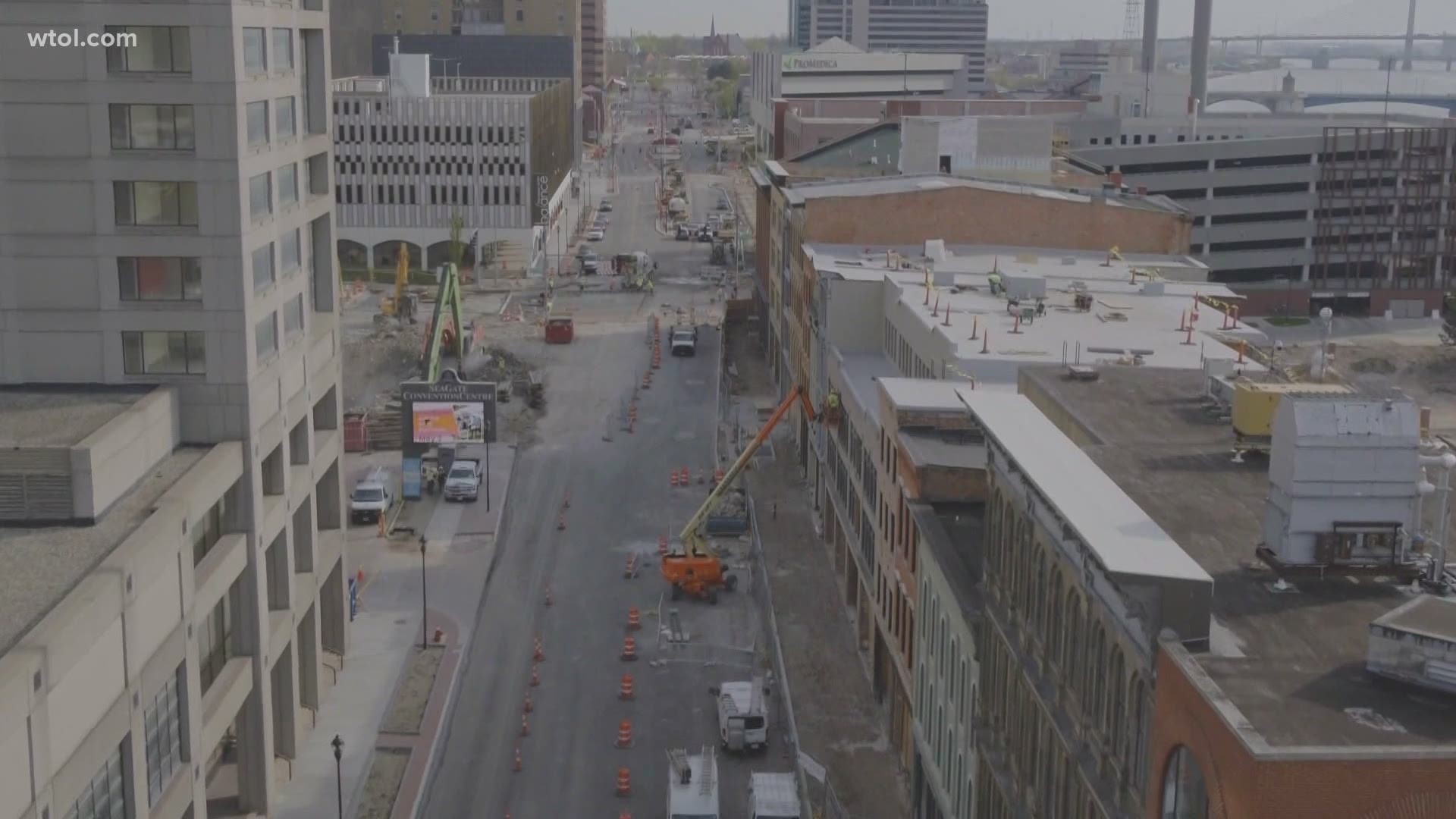TOLEDO, Ohio — Toledo City Council Tuesday officially supported a move to take legal action in an effort to recoup any expenses it incurred for work done in conjunction with the Summit St. reconstruction project. That includes more than $972,000 Toledo spent to move utility lines under Summit Street belonging to Buckeye Broadband, owned by Block Communications Inc.
Mayor Wade Kapszukiewicz's administration filed a lawsuit on June 11 against Block Communications Inc., after the city paid to move those fiber-optic lines as part of the project that has also drawn FBI scrutiny.
Earlier on Tuesday, Block Communications Inc. filed to dismiss the lawsuit put forth by the city, claiming leaders "knowingly, willingly, and properly agreed to cover, and did cover, the cost of moving Buckeye's lines."
Below is the Block Communications statement in full:
"Buckeye Broadband today filed its response to the City of Toledo’s lawsuit which seeks to impose upon Buckeye the cost of moving its fiber-optic cable lines to accommodate the City’s Summit Street beautification project. Buckeye’s response asks the court to dismiss the City’s lawsuit for the reasons Buckeye cited when the suit was originally filed.
First, the City knowingly, willingly, and properly agreed to cover, and did cover, the cost of moving Buckeye's lines. A year later the City cannot willy-nilly change its mind, turn back the clock and go for a "re-do."
Second, Ohio law provides clearly that when the government undertakes an aesthetic streetscape beautification project such as this, the government must cover the cost of any utility relocations, not the private companies that just happen to have facilities in the project area.
Finally, it certainly seems wholly illogical that the City is considering adopting a resolution to sue us when, if they will check their files, they'll see that they have already suied us.
We look forward to having the court review this matter and to an order dismissing the City's lawsuit."
Council approved $75,000 to spend on outside counsel, meaning law director Dale Emch would not oversee the case.
Emch said last July the project involved aesthetic improvements, so the city was responsible for the expense.
CITY OF TOLEDO COMPLAINT
The city's complaint was filed in Lucas County Common Pleas Court and seeks a declaration that Buckeye's parent company is responsible for the full cost of relocating its facilities located within the city right of way at or near Summit Street. Previously, the city law director had said the city was responsible for the expense.
Block Communications cited the city's previous stance in a response it released Friday, reasserting the company was in the right to not pay the city.
The city says Buckeye's parent company should bear the costs:
"As a result of the City being forced to pay for Buckeye facility relocations and change, Buckeye unjustly benefitted from the City’s payments. Buckeye is therefore obligated to reimburse the City for monies expended on Buckeye’s behalf and for Buckeye’s benefit," the city's complaint reads.
The city wants a court to order Buckeye to reimburse the city $972,474.60 for the costs to relocate and change facilities "that Buckeye should have paid in the first instance," the complaint says.
In the complaint, the city asserts in order to get the Summit Street project done in time for expected visitors from the Solheim Cup by the end of August, the city asked Buckeye along with the other utility companies, to relocate and change the position of certain of their facilities "located within the city’s right of way so the project could move forward as well as support economic development in the downtown area. Except for Buckeye, all other utility companies had relocated their facilities by the spring of 2020."
READ THE CITY'S ENTIRE COMPLAINT
BLOCK COMMUNCATIONS' INITIAL RESPONSE
BCI initially responded to the complaint soon after it was filed, citing the city's "about-face" when it comes to who is responsible for paying the relocation costs.
"Over a year ago, Block Communications, Inc. (“BCI”) and the City Administration came to an agreement about the party responsible for the cost of moving Buckeye Broadband’s utilities in connection with the Summit Street Improvement Project. Based on clear statutory authority and case law, the City concluded that the City was responsible for the cost. Now, a year later, apparently facing some political pressure, the City has done an about-face and is suing BCI for the cost of the relocation," the BCI statement said.
"We are deeply disappointed that the City has decided to file a lawsuit against BCI because the facts and law are clear. The Summit Street Improvement Project was all about improving the look and feel of downtown Toledo to, as the Mayor has repeatedly said, putting its best foot forward. Portraying the City in a positive light is wonderful, but that should not come at a substantial unjustified expense to BCI."
READ BCI'S RESPONSE ON RELOCATION COSTS
The city said it met with all of the utility companies that would be affected by the Summit Street project and four of the companies agreed to pay a combined $570,000 to move their equipment; Buckeye, however, objected and said the cost should bear that cost.
"Though asked to relocate its facilities in order for the above-described projects to be completed in a timely fashion, Buckeye did not do so," the city's complaint reads.
The city said Buckeye said it was not required to bear the cost of relocation of its facilities and lines pursuant to Toledo Municipal Code section 945.10 (b).
Buckeye claimed the project was being undertaken for non-transportation aesthetic purposes citing to a provision of the Toledo Municipal Code at 945.10 (b)(4) which states that the owner of facilities such as Buckeye need not bear the cost of relocation or change of its facilities within the city right of way if such action is being undertaken for “*a non-transportation related aesthetic improvement.” Buckeye also cited Ohio law for its position.
"No agreement having been reached with the City, and with time running out to timely complete the project, ultimately, Buckeye said it would pursue legal action against the City to avoid paying its relocation costs," the lawsuit reads.
"The City, not wishing to jeopardize the completion of such an important project, or risk the project not being completed by the 2021 Solheim Cup, elected in good faith based upon the language of Toledo Municipal Code 945.10(b)(4), Ohio Law, and City Ordinance 180-20, to bear the Buckeye relocation costs at that time. The City paid its general contractor to accomplish the movement of Buckeye’s facilities which consisted of fiber-optic lines."

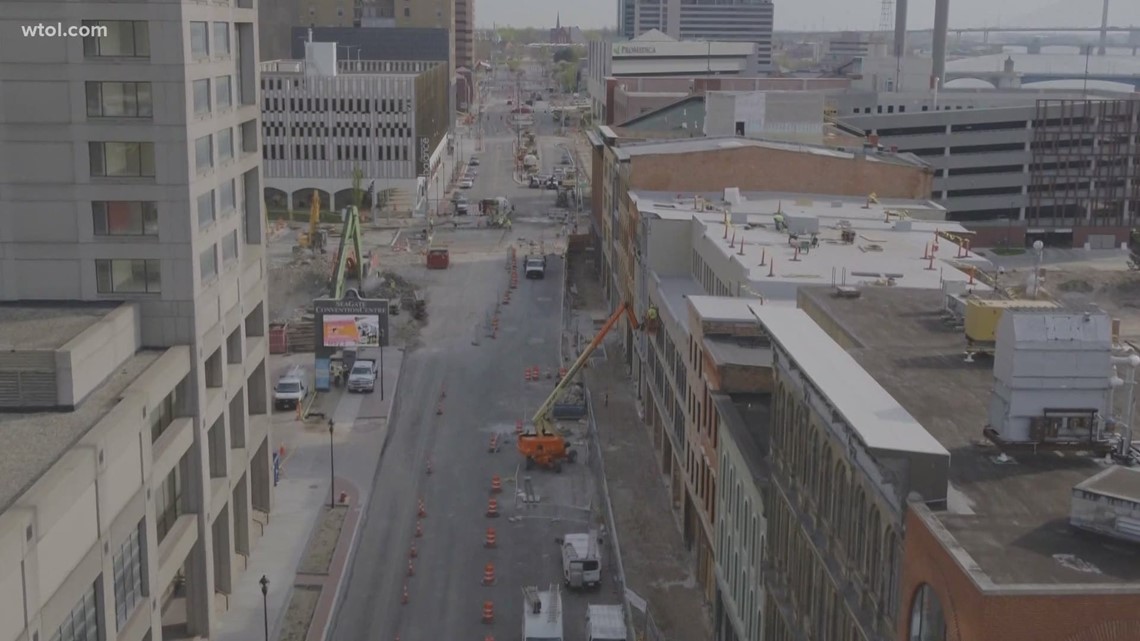
On June 10, the administration issued a statement signaling the city law department would sue to recoup costs:
“For several weeks, the City of Toledo has been exploring ways to best protect the long-term interests of its citizens regarding various issues related to the Summit Street project. As we’ve said before, the administration intends to work with City Council on any effort that would help recover costs owed to the City of Toledo.
"Toward that end, the City of Toledo Law Department will be filing suit against BCI [Block Communications Inc., parent company of Buckeye Broadband] to recoup costs associated with the utility work done during the project.
COUNCIL RESOLUTION TO RECOUP ON AGENDA
An agenda for the June 22 Toledo City Council meeting shows a resolution will be considered directing the city law department to recoup money paid to move Buckeye Broadband fiber-optic cable as part of the Summit Street renovation project - a project that is also under FBI scrutiny.
The resolution, crafted by council members Rob Ludeman and Nick Komives, directs the city law director to take all actions including legal actions "to seek complete reimbursement from any and all parties for all costs incurred by the City for any revisions to privately owned facilities associated with the Summit Street Roadway Improvement Project; and declaring an emergency."
City spokesman Ignazio Messina said Thursday the administration supports the resolution to recoup the money.
“We are exploring different options,” Messina said. “The administration supports efforts by, and intends to partner with, Councilman Ludeman in exploring strategies, including litigation, that would help recover costs owed to the City of Toledo.”
RESOLUTION LANGUAGE, PAGES 6-7
CITY'S PREVIOUS STANCE
Previously, Toledo city leaders acknowledged an FBI investigation into the project, stating that while the decision may be "unpopular among some people, it does not mean it was unlawful or inappropriate."
In a press release on May 21, representatives of the city said that the decision was weighed heavily and guided by "legal interpretations of state and municipal law."
The money was paid to a contractor to move Buckeye's fiber optic cables as part of the reconstruction. No other utility had that work done by the city.
On July 20, 2020, Law Director Dale Emch said that because the project involved aesthetic improvements, the city was responsible for the expense. However, other utilities combined to spend as much as $570,000 of their own money to move their equipment. Utilities are responsible for the bill if a project is a "reasonably necessary" reconstruction.
On Wednesday, Ludeman told WTOL 11 that he fears that those utilities will now ask to be reimbursed. Councilman Nick Komives said that paying for the work done for Buckeye Broadband to move its lines was improper because it is clearly reconstruction and not aesthetic.
He said the payment to move lines took place after the project was already approved by council in May 2020. He said it sets a "terrible precedent" for future road reconstruction projects.

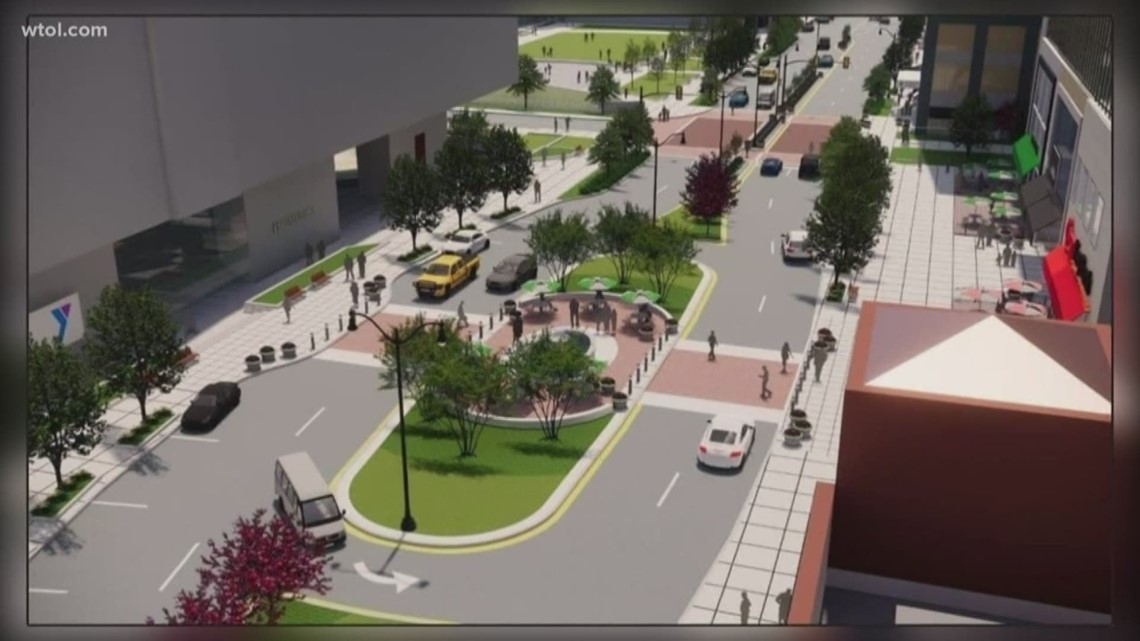
BLOCK COMMUNICATIONS STATEMENT
Keith Wilkowski, vice president of legal and governmental affairs for Block Communications, parent company of Buckeye Broadband, provided the following statement when he was asked if Block Communications would fight any attempt to recoup the money:
"In May 2020 the city administration acknowledged that the city – not Buckeye Broadband – was responsible for the cost of relocating Buckeye’s fiber-optic communications lines on Summit Street. This streetscape beautification project was being undertaken to improve the appearance of Summit Street in the vicinity of ProMedica's new headquarters and in advance of the 2021 Solheim Cup golf tournament.
"Longstanding Ohio law and precedent support the conclusion that the city is the financially responsible party in this situation, notwithstanding any provisions of the Toledo Municipal Code. As recently as three weeks ago, the city administration again publicly reaffirmed that it had acted properly in covering these costs.
"But now it appears that after experiencing some political pressure, the administration is backpedaling. If the city decides to spend substantial legal fees in an effort to change the law of Ohio, Buckeye stands ready to vigorously defend its legal position."
FBI INVESTIGATION
The decision by the city to pick up nearly $1 million in costs to move the utilities also has the FBI involved.
On May 21, Toledo city leaders acknowledged the investigation, stating that while the decision may be "unpopular among some people, it does not mean it was unlawful or inappropriate."
In a press release, representatives of the city said that the decision was weighed heavily and guided by "legal interpretations of state and municipal law."
Below was the city's official statement at that time:
"The City of Toledo is aware that authorities have asked for information regarding the Summit St. beautification project. The city is happily providing this information.
"Difficult public policy decisions are made every day in city offices, but the fact that this decision may be unpopular among some people does not mean it was unlawful or inappropriate. In fact, this decision was made based on multiple considerations – and it was guided by legal interpretations of state and municipal law.
"City officials made a public policy decision to beautify an important section of downtown to help Toledo prepare for its largest international event in decades. The City of Toledo moved forward only after receiving legal guidance and direction. The City of Toledo will have no further comment on the matter until it is resolved."

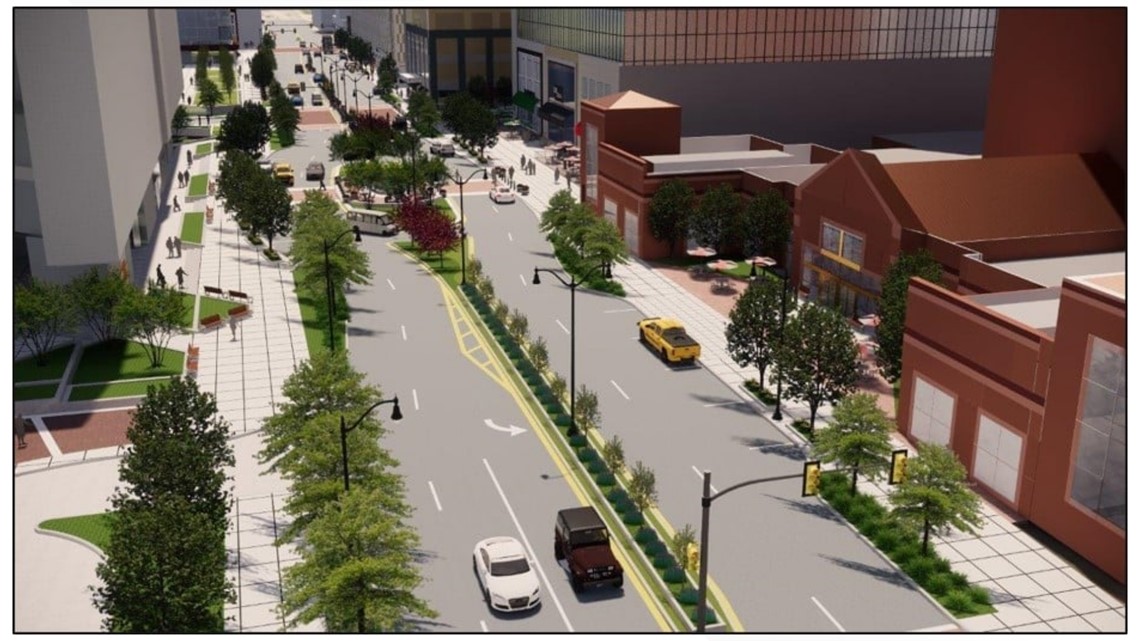
BACKGROUND
Ludeman said he spoke with an FBI agent about the project, specifically about taxpayers funding utility relocations. Ludeman also says he asked the city for answers regarding paying for utilities to move lines or equipment, but never received any.
Toledo Municipal Code 945.10 says every owner of facilities in the right of way shall remove or relocate facilities at their own expense when the city determines it's necessary for the following reasons:
- The need to construct, repair, maintain, improve or use the right of way or public property
- The need to locate, construct, replace, maintain, improve or use any other city property
- The efficient performance of city operations
That section also makes an exception, saying no permit holder shall, without reasonable compensation, be required by the city to relocate, change, support, hold or alter the position of any facility for a non-transportation-related aesthetic improvement.
According to public utilities documents obtained June 9, there was about $972,000 paid from the Capital Improvement Program fund budget for the relocation of Buckeye lines. About $587,000 was noted as the cost for other utility relocation, but it's not mentioned whether those were paid to those entities. Legislation was then drawn up seeking $600,000 for cost of "relocation of utilities." It's unclear at this time what the outcome of that legislation was.
Emails from Buckeye Broadband termed the Summit Street Reconstruction Project as "an upcoming City of Toledo government mandate project" as far back as Oct. 1, 2019.
The question of whether the relocation of utility lines for the Summit Street project was required because a mandatory move or one of beautifying the area was discussed by city officials in various departments before City Law Director Dale Emch came down on the side of it being a beautification project - meaning according to city code utility companies would not be responsible for costs of relocating their lines.
Councilmen Nick Komives and Rob Ludeman dispute the assessment that it's the city's responsibility to pay for the move and plan to write a resolution asking that any utility that didn't pay to move its own lines to repay the city.
On Sept. 3, 2020, Deputy Public Utilities Director Doug Stephens said in an email regarding the funding legislation for the Summit Street project that items in green on an attached document "should be crafted by someone other than DPU (Department of Public Utilities)."
He further said he's "happy to support in the presentation but I really think this should be presented by Dale (Emch, law director)/Law. I will certainly punt almost any questions about this that are not technical in nature to him anyway."
The "items in green" sought council's authorization for "$600,000 from the Capital Improvement Program Fund for the Summit Street Project; to enter into contracts for the relocation of utilities to allow for successful completion of the Summit Street Reconstruction Project being administered by the Division of Engineering Services..."
"Engineering Services is requesting $600,000 from the Capital Improvement Program Fund for utility relocation necessary for successful completion of the Summit Street Reconstruction Project. This item is for projects that utilize 100% City of Toledo capital funds to rebuild or resurface primarily local residential streets."
Other parts highlighted in green - for which Stephens was deferring to the city law department to write - include parts of Section 1 and Section 2:
SECTION 1. That the mayor is authorized to execute necessary contracts or agreements with private utility companies located within the construction area of the Summit Street Reconstruction Project to pay for the cost of mandatory relocations in the public right of way to accommodate the new public infrastructure. Said contracts or agreements shall contain such terms and conditions as the mayor may deem requisite and proper and shall be subject to approval by the Director of Public Utilities and the Director of Law.
SECTION 2. That an amount not to exceed $600,000 is authorized for appropriation from the Capital Improvement Program Fund, Account Code 5040-35000-8CB2033SUMMST and further authorizing the expenditure of same for privately owned utility relocations withing [sic] the construction area of the Summit Street Reconstruction Project.

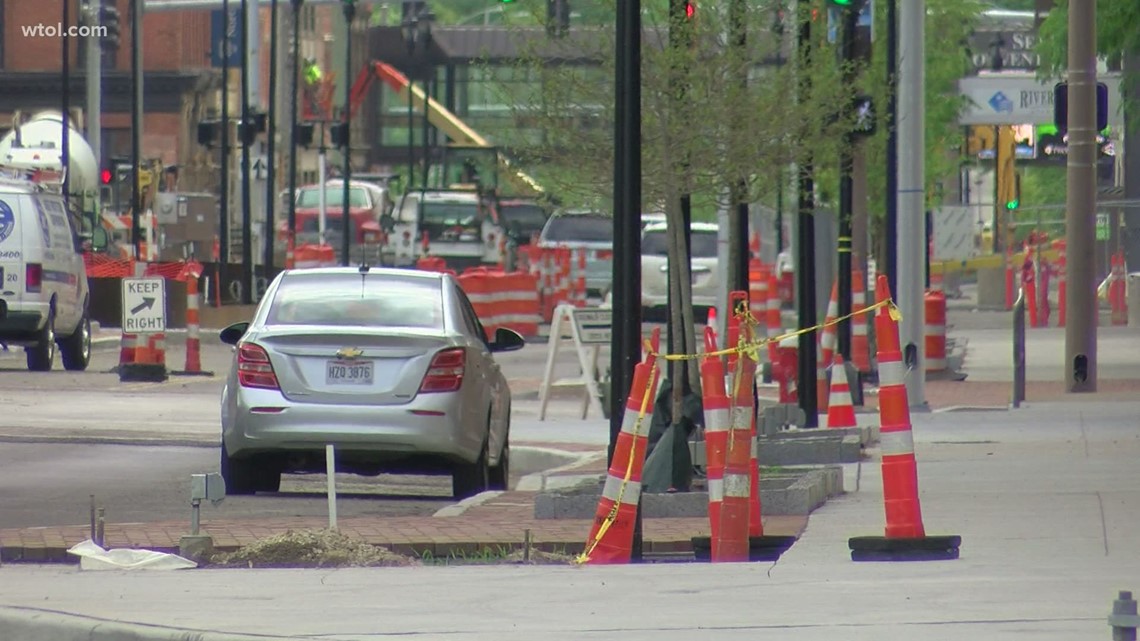
He further said in an email to Carol Wagner, CC'd to Susan Russeau and Christy Soncrant, that "honestly, I don't think DPU should present this legislation so hopefully they will and we will be support."
A spreadsheet was included with that Sept. 3 email that was noted to be "for our information only. Do not forward it beyond this email."
That spreadsheet showed there was about $972,000 paid from the CIP budget for the relocation of fiber optic lines, according to the public utilities department. A line item for Buckeye Broadband Facilities Relocation totaled $617,687.69.
About $587,000 was noted as the cost for other utility relocation, but it's not mentioned whether those were paid to those entities. Columbia Gas relocation cost was $275,000; AT&T was $87,000; Zayo was $200,000; and Charter was $25,000. Legislation was then drawn up seeking $600,000 for cost of "relocation of utilities."
In emails obtained by WTOL 11, city Auditor Jake Jaksetic also asked about the city's decision and brought it up with Law Director Dale Emch.
In July 2020, Emch provided him with an answer:
"I made the legal decision pursuant to Toledo Municipal Code 945.10(b)(4) that the city should bear the utility relocation cost for this aesthetic improvement to Summit Street," Emch said in the email. "A basic tenant of legal interpretation is to give words their plain meaning. The dictionary defines 'aesthetic' as 'relating to or dealing with aesthetics or the beautiful.'
"Given that Summit Street was resurfaced approximately two years ago, the project would not have occurred absent a desire to make the area more attractive. That the city is taking advantage of the opportunity to complete additional work under the road does not change the primary reason for pursuing the project."
The $10.55 million Summit Street project has been described by city officials as both a necessary infrastructure improvement and an aesthetic upgrade ahead of Toledo hosting the 2021 Solheim Cup. At its inception in 2019, the plan was pegged to cost $7.5 million.
The city did issue a statement regarding the Summit Street project on May 20:
“We are really proud of the work going on at Summit Street, which will transform that part of downtown and get us ready for an international sporting event coming to Toledo this year, and if there are any questions, we will of course answer those fully with the appropriate authorities."
On May 20, Komives told WTOL 11 the city paid $972,000 to have the work done. That figure was later confirmed by city documents provided to WTOL 11.
Ludeman said he asked the administration how much it would cost the city to move the utilities, what the cost would be to others and if any 2 percent utility funds would be utilized.
"I never got an answer to this referral," Ludeman said.

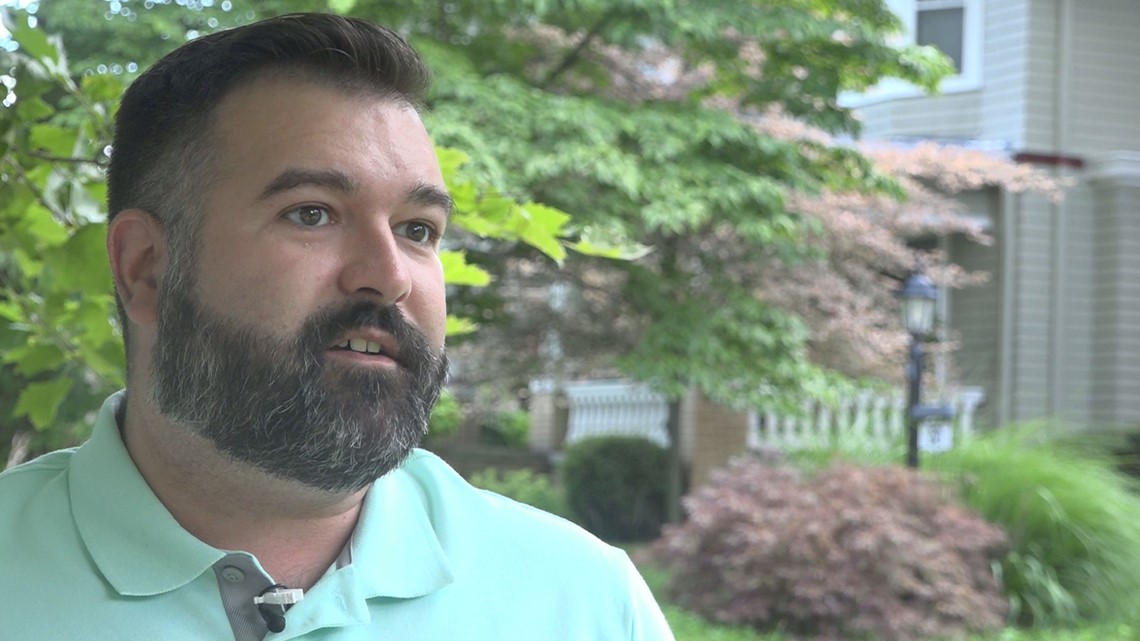
Komives declined to discuss the FBI's involvement but did say he disagrees with the decision to pick up the tab to move the Buckeye Broadband lines.
"I believe it’s their responsibility to pay us, and I think they should pay us," Komives said. "And the way to make that happen would be to have the law director of this city enforce the laws and fight for our tax dollars."
Columbia Gas and Toledo Edison companies also had lines removed and replaced during the project but according to Komives those companies paid to have their lines removed.
We have reached out to Toledo Edison and Columbia Gas for comment. We also asked if the city offered to cover their expenses for the project.
On May 21, Columbia Gas responded with a statement, saying, "the Summit Street Project is a City Project. We have no comment at this time."
In 2019, the Toledo Regional Chamber of Commerce released sketches of a "signature roadway in the central business district" that was to include a brand new road and an improved pedestrian experience with "new sidewalks, street trees, furniture, landscaping, and more."

